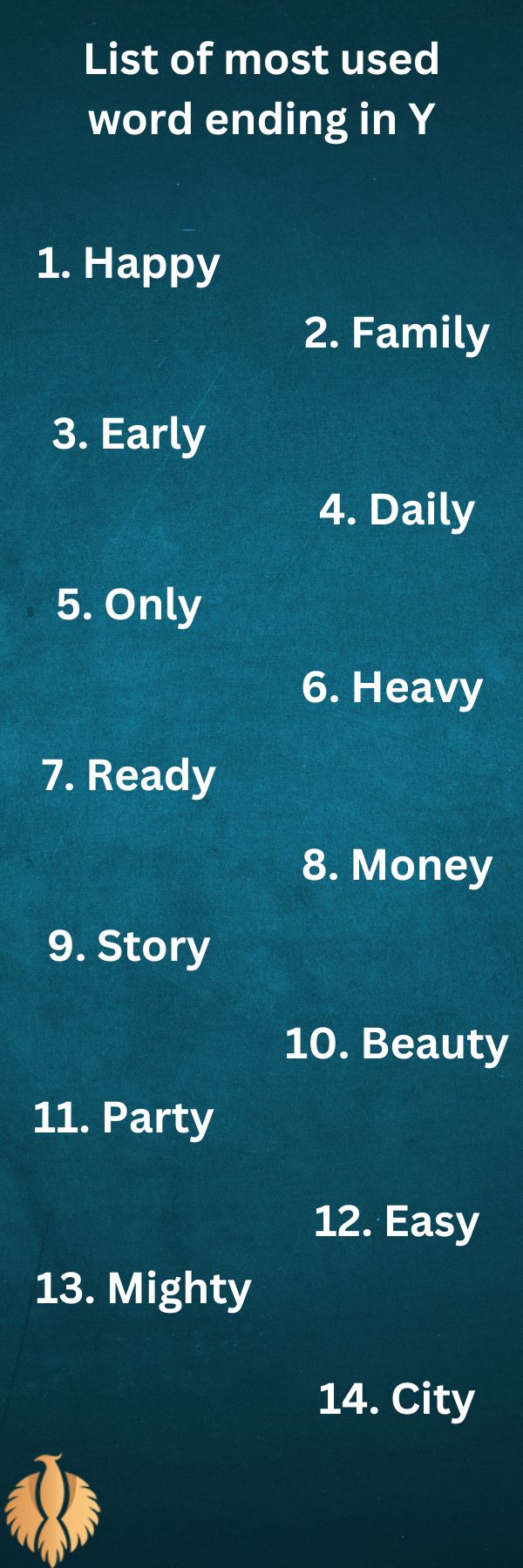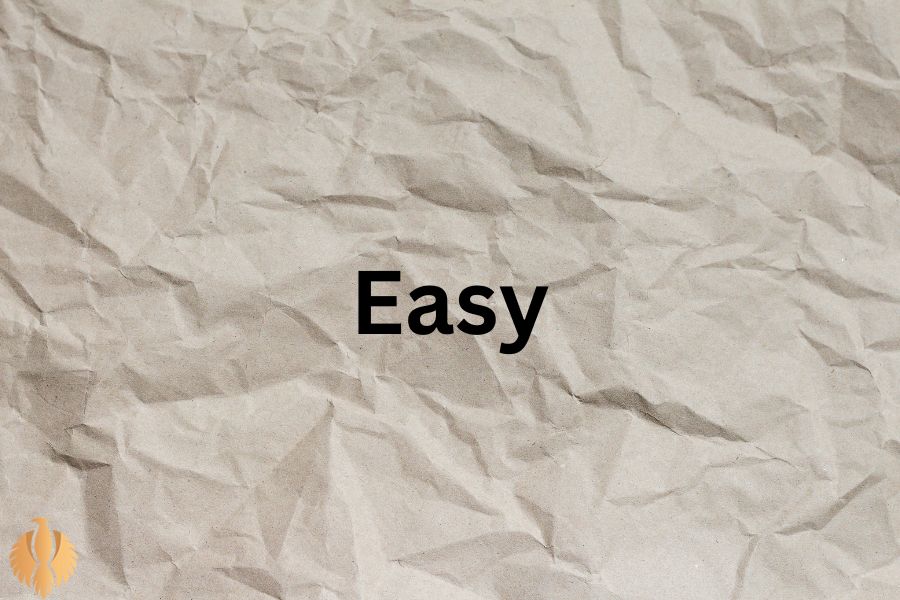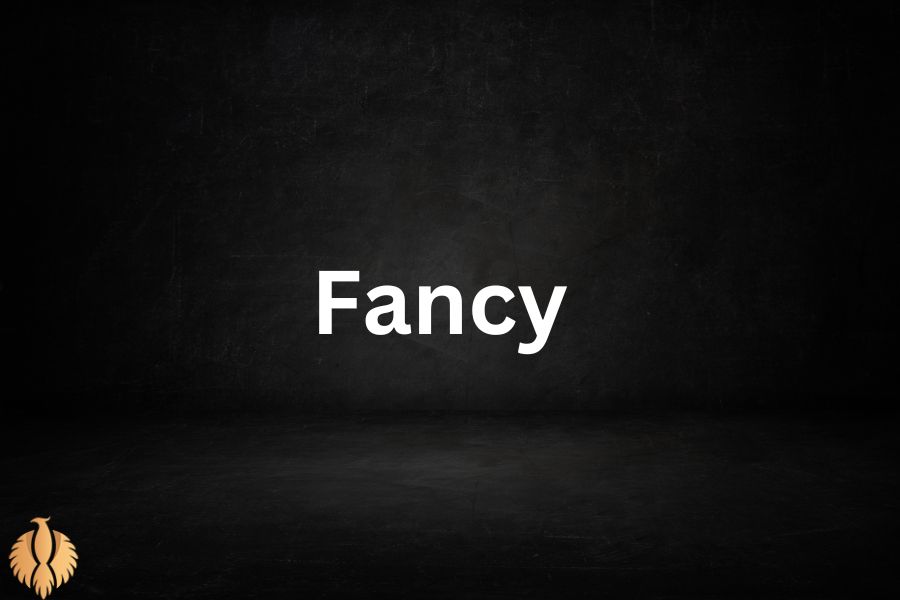Words ending in “y” are scattered all over the English language, weaving through our conversations and writings with a subtle yet significant presence.
These words, often concise and impactful, bring a distinct flavor to our communication.
They range from the mundane to the profound, capturing emotions, states, actions, and descriptions that enrich our daily expressions.
The helpfulness of these words lies in their versatility and frequency, allowing us to convey complex ideas with simplicity and ease.
Take the word “happy” for instance, a term that encapsulates joy and contentment, making it a cornerstone of positive expression.
Or consider “money,” a five-letter word carrying the weight of our financial world, influencing decisions and lifestyles.
“Family” binds us with emotional threads, grounding us in our relationships and heritage. Each of these words carries layers of meaning, contributing to the texture of our dialogues. ️
The importance of these words is not just in their meanings, but in their frequency and versatility.
They appear in everyday conversations, literature, media, and even in our thoughts, shaping the way we perceive and interact with the world around us.
By examining the top 50 most used words ending in “y,” we can gain insights into the patterns and priorities of our language, reflecting societal values and individual experiences.
This exploration will dive into the origins, meanings, and usage of these words, highlighting their role in our linguistic landscape.
Let’s embark on this journey to uncover the significance of words ending in “y” and appreciate their contribution to the richness of the English language.
You might also enjoy: Top 100 Commonly Used Verbs That Start With C [2024]
List of most used word ending in Y

1. Happy
The word that captures that positive state we all crave.
2. Family ❤️
Fundamental to our social structure.
3. Early
Important for catching worms, or so they say.
4. Daily
Reflects the grind of everyday life.
5. Only ☝️
A word for exclusivity.
6. Heavy
For those weights or emotions that weigh us down.
7. Ready
Always be prepared!
8. Money
Talks, doesn’t it?
9. Story
We all have one to tell.
10. Beauty
In the eye of the beholder.
11. Party
Who doesn’t love a good one?
12. Easy

Something we all wish life was more often.
13. Mighty
Power-packed.
14. City
Urban life encapsulated.
15. Sorry
Admitting our mistakes.
16. Baby
They bring joy and chaos in equal measure.
17. Empty
The state of my coffee cup right now.
18. Body
The vessel we navigate life with.
19. Funny
What keeps us laughing?
20. Guilty
You Might Also Enjoy: How To Learn English Speaking At Home: My 12 Tips
An emotion none of us like.
21. Nervy
The feeling before a big speech.
22. Silly
We all need a bit of this.
23. Windy
Weather forecast staple.
24. Fruity
A flavor many enjoy. ☺️
25. Hasty
What happens when we’re in a rush?
You might also enjoy: Top 100 Commonly Used Verbs That Start With D [2024]
26. Bravery
Essential in times of trouble.
27. Tasty
What we look for in food.
28. Glory
What we aim for.
29. Honey
Sweet in every way.
30. Fancy

For those extra special occasions.
31. Bumpy
Describes both rides and journeys.
32. Crafty
Both clever and sneaky.
33. Starry
A sky full of dreams.
34. Trusty
Dependability.
35. Spicy
Adds that extra kick.
36. Lengthy
Like a good novel.
37. Empty
When the snack jar is out.
38. Frosty
Both weather and moods.
39. Lively
Full of energy.
40. Lazy

We all have those days.
41. Jumpy
Reaction to sudden scares.
42. Messy
Describes my desk right now.
43. Zesty
Life with a bit of zing.
44. Witty
The goal of every comedian.
45. Quirky
You might also enjoy:Boys’ or Boy’s– Which One is Correct? + Example
Uniqueness at its best.
46. Rusty
When skills need a refresh.
47. Wealthy
More than just money.
48. Creepy
A little shiver down the spine.
49. Sorry
Expresses regret.
50. Gutsy
Bravery with a twist

Conclusion
These words, despite their brevity, are powerful in their utility and impact. The sheer frequency with which we use them underscores their essential role in our communication.
From conveying the smallest details to the grandest emotions, they are the unsung heroes of our linguistic toolkit.
By now, we can see that words ending in “y” are more than just linguistic constructs; they are vital to how we express ourselves.
They simplify our sentences without losing depth, making communication efficient yet expressive. Their origins often trace back centuries, evolving in meaning and usage, thus showcasing the dynamic nature of language.
In examining their origins, meanings, and usage, we gain not only a deeper appreciation for these words but also for the way language evolves to meet our communicative needs.
Whether it’s the comforting “family,” the exciting “party,” or the solemn “guilty,” words ending in “y” are integral to conveying the myriad nuances of life.
This exploration has shown how versatile and impactful these words are, highlighting their role in shaping our thoughts and conversations.
They remind us of the power of language to connect, inspire, and articulate the human experience in all its complexity.
So, the next time you find yourself reaching for a word that ends in “y,” remember the rich tapestry of meaning it brings with it, and appreciate its small but mighty contribution to the world of words.
These top 50 most used words ending in “y” are not just entries in a dictionary; they are living, breathing elements of our daily vernacular.
They encapsulate feelings, actions, and states of being that are pivotal to human interaction. Their importance is reflected in their ubiquity, showing up in conversations, written texts, and even in our thoughts.
Take “happy” again, for example. It’s not just a word; it’s an aspiration, a state of being that we all strive for.
When someone asks you, “Are you happy?” it’s a loaded question that delves into your mental and emotional state.
Similarly, “money” isn’t just a term; it’s a cornerstone of society, impacting every facet of our lives from the food we eat to the places we live.
Words like “family,” meanwhile, are foundational to our understanding of ourselves and our place in the world.
Let’s not forget the emotional weight these words can carry. Words like “guilty” or “sorry” evoke a range of feelings and contexts, from personal regret to social apologies.
“Bravery” and “mighty,” on the other hand, inspire courage and strength, reminding us of our potential and resilience.
Even seemingly simple words like “tasty” or “spicy” can transport us to a sensory experience, making our mouths water at the thought of a delicious meal.
Through this lens, we see that words ending in “y” are not just simple modifiers or descriptors; they are essential tools in our communicative arsenal.
They help us navigate the world, relate to others, and even understand ourselves better. In a way, these words are small linguistic powerhouses, packing a punch far greater than their short length might suggest.
In conclusion, the top 50 most used words ending in “y” illustrate the richness and versatility of the English language.
They are the glue that holds our sentences together, the spices that add flavor to our conversations, and the mirrors that reflect our innermost thoughts and feelings.
Appreciating these words is appreciating the very essence of communication itself. So next time you use a word ending in “y,” take a moment to reflect on its importance and the subtle power it wields in your everyday interactions.

Hi, welcome to my blog! My name is Omid and I am thrilled to have you here! I am an English language teacher with 12 years of experience and hold multiple international certifications (TESOL, IELTS, TOEFL, PTE, CELTA). Additionally, I hold a PhD in Applied Linguistics with a specialization in Teaching English as a Second Language (TESL), which fuels my passion for teaching English and assisting others in mastering the language. To me, nothing is more rewarding than helping individuals enhance their English language abilities through various methods. So, let’s embark on this journey of learning English together.

![a featured image for Top 50 Most Used Words Ending in Y [2024 Update]](https://phoenixenglishlang.com/wp-content/uploads/2024/10/Top-50-Most-Used-Words-Ending-in-Y-2024-Update.jpg)


